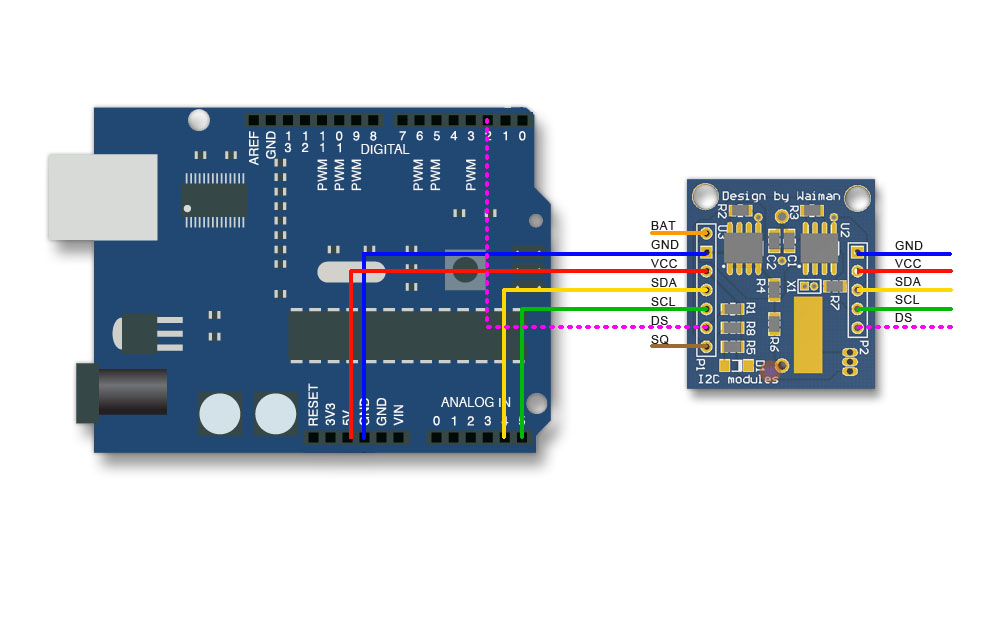Real_Time_Clock_Module_(DS1307)_(SKU_DFR0151)
Angelo edited this page Sep 21, 2016
·
3 revisions

This is the DS1307 Real Time Clock developed by one of our designer waiman. The module comes fully assembled and pre-programmed with the current time (ok, so it's our current time - MST). The included Lithium coin cell battery (CR1225 41mAh) will run the module for a minimum of 9 years (17 years typical) without external 5V power. The DS1307 is accessed via the I2C protocol.
- Two wire I2C interface
- Hour : Minutes : Seconds AM/PM
- Day Month, Date - Year
- Leap year compensation
- Accurate calendar up to year 2100
- Battery backup included
- 1Hz output pin
- 56 Bytes of Non-volatile memory available to user

// #############################################################################
// #
// # Scriptname : DS1307_Test.pde
// # Author : Peter Schmelzer, Oliver Kraus
// # Date : 2011-04-08
// # Editor : Lauren from DFRobot
// # Date : 30.12.2011
// # Description:
// # Test file for the DS1307new library. Assumes that you have a DS1307
// # connected to the I2C-Bus of your Arduino and that it has a battery backup.
// # Update the library and sketch to compatible with IDE V1.0 and earlier
// # Version : 1.0
// #############################################################################
// *********************************************
// INCLUDE
// *********************************************
#include <Wire.h> // For some strange reasons, Wire.h must be included here
#include <DS1307new.h>
// *********************************************
// DEFINE
// *********************************************
// *********************************************
// VARIABLES
// *********************************************
uint16_t startAddr = 0x0000; // Start address to store in the NV-RAM
uint16_t lastAddr; // new address for storing in NV-RAM
uint16_t TimeIsSet = 0xaa55; // Helper that time must not set again
// *********************************************
// SETUP
// *********************************************
void setup()
{
pinMode(2, INPUT); // Test of the SQW pin, D2 = INPUT
digitalWrite(2, HIGH); // Test of the SQW pin, D2 = Pullup on
Serial.begin(9600);
/*
PLEASE NOTICE: WE HAVE MADE AN ADDRESS SHIFT FOR THE NV-RAM!!!
NV-RAM ADDRESS 0x08 HAS TO ADDRESSED WITH ADDRESS 0x00=0
TO AVOID OVERWRITING THE CLOCK REGISTERS IN CASE OF
ERRORS IN YOUR CODE. SO THE LAST ADDRESS IS 0x38=56!
*/
RTC.setRAM(0, (uint8_t *)&startAddr, sizeof(uint16_t));// Store startAddr in NV-RAM address 0x08
/*
Uncomment the next 2 lines if you want to SET the clock
Comment them out if the clock is set.
DON'T ASK ME WHY: YOU MUST UPLOAD THE CODE TWICE TO LET HIM WORK
AFTER SETTING THE CLOCK ONCE.
*/
// TimeIsSet = 0xffff;
// RTC.setRAM(54, (uint8_t *)&TimeIsSet, sizeof(uint16_t));
/*
Control the clock.
Clock will only be set if NV-RAM Address does not contain 0xaa.
DS1307 should have a battery backup.
*/
RTC.getRAM(54, (uint8_t *)&TimeIsSet, sizeof(uint16_t));
if (TimeIsSet != 0xaa55)
{
RTC.stopClock();
RTC.fillByYMD(2011,4,8);
RTC.fillByHMS(22,7,0);
RTC.setTime();
TimeIsSet = 0xaa55;
RTC.setRAM(54, (uint8_t *)&TimeIsSet, sizeof(uint16_t));
RTC.startClock();
}
else
{
RTC.getTime();
}
/*
Control Register for SQW pin which can be used as an interrupt.
*/
RTC.ctrl = 0x00; // 0x00=disable SQW pin, 0x10=1Hz,
// 0x11=4096Hz, 0x12=8192Hz, 0x13=32768Hz
RTC.setCTRL();
Serial.println("DS1307 Testsketch");
Serial.println("Format is \"hh:mm:ss dd-mm-yyyy DDD\"");
uint8_t MESZ;
MESZ = RTC.isMEZSummerTime();
Serial.print("MEZ=0, MESZ=1 : ");
Serial.println(MESZ, DEC);
Serial.println();
}
// *********************************************
// MAIN (LOOP)
// *********************************************
void loop()
{
RTC.getTime();
if (RTC.hour < 10) // correct hour if necessary
{
Serial.print("0");
Serial.print(RTC.hour, DEC);
}
else
{
Serial.print(RTC.hour, DEC);
}
Serial.print(":");
if (RTC.minute < 10) // correct minute if necessary
{
Serial.print("0");
Serial.print(RTC.minute, DEC);
}
else
{
Serial.print(RTC.minute, DEC);
}
Serial.print(":");
if (RTC.second < 10) // correct second if necessary
{
Serial.print("0");
Serial.print(RTC.second, DEC);
}
else
{
Serial.print(RTC.second, DEC);
}
Serial.print(" ");
if (RTC.day < 10) // correct date if necessary
{
Serial.print("0");
Serial.print(RTC.day, DEC);
}
else
{
Serial.print(RTC.day, DEC);
}
Serial.print("-");
if (RTC.month < 10) // correct month if necessary
{
Serial.print("0");
Serial.print(RTC.month, DEC);
}
else
{
Serial.print(RTC.month, DEC);
}
Serial.print("-");
Serial.print(RTC.year, DEC); // Year need not to be changed
Serial.print(" ");
switch (RTC.dow) // Friendly printout the weekday
{
case 1:
Serial.print("MON");
break;
case 2:
Serial.print("TUE");
break;
case 3:
Serial.print("WED");
break;
case 4:
Serial.print("THU");
break;
case 5:
Serial.print("FRI");
break;
case 6:
Serial.print("SAT");
break;
case 7:
Serial.print("SUN");
break;
}
Serial.print(" seconds since 1.1.2000:");
Serial.print(RTC.time2000, DEC);
uint8_t MESZ = RTC.isMEZSummerTime();
Serial.print(" MEZ=0, MESZ=1 : ");
Serial.print(MESZ, DEC);
Serial.print(" - Address in NV-RAM is: ");
RTC.getRAM(0, (uint8_t *)&lastAddr, sizeof(uint16_t));
Serial.print(lastAddr, HEX);
lastAddr = lastAddr + 1; // we want to use it as addresscounter for example
RTC.setRAM(0, (uint8_t *)&lastAddr, sizeof(uint16_t));
RTC.getRAM(54, (uint8_t *)&TimeIsSet, sizeof(uint16_t));
if (TimeIsSet == 0xaa55) // check if the clock was set or not
{
Serial.println(" - Clock was set!");
}
else
{
Serial.println(" - Clock was NOT set!");
}
delay(1000); // wait a second
}Arduino Library (compatible with IDE version 1.0 and lower)
Sample code, library, and wiring diagram
 shopping real time clock module (ds1307) (sku:dfr0151)
category: Product Manual category: DFR Series category: Modules category: source category: Diagram
shopping real time clock module (ds1307) (sku:dfr0151)
category: Product Manual category: DFR Series category: Modules category: source category: Diagram